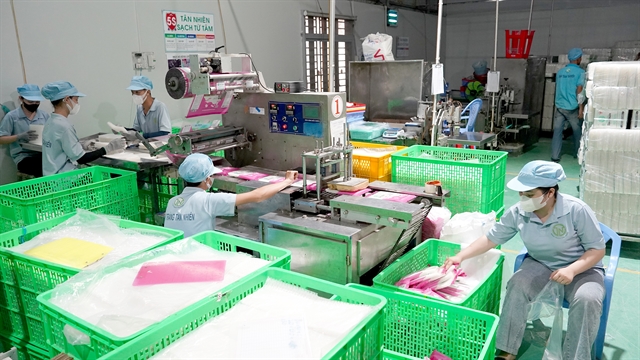 Society
Society

 |
| Workers at the Tân Nhiên Company Limited in Tây Ninh Province’s Hoà Thành Town pack super-thin rice paper in plastic bags. The rice paper has been recognised as an OCOP product under the country’s “One Commune – One Product” programme. – VNA/VNS Photo Thanh Tân |
TÂY NINH – The southeastern province of Tây Ninh is developing more products under the country’s “One Commune - One Product” programme to increase their value and markets.
It has various agricultural and specialty products such as custard apples, forest vegetables, honey, rice paper, red chili salt and sour sop juice, and many of them have been recognised as OCOP products.
The province has 68 OCOP products, including 47 rated three stars, 20 rated four stars and one rated five stars, which is the programme’s highest level.
The programme has offered an opportunity to develop the province’s agricultural and specialty products.
Bàu Đồn durian in Gò Dầu District’s Bàu Đồn Commune is the province’s specialty fruit as it is very delicious and has a specific flavour compared to other durian varieties.
Bàu Đồn durian planted by the Bàu Đồn Fruit Co-operative in the commune was recognised as a four-star OCOP product last year.
Phan Hoài Thịnh, director of the co-operative, said his co-operative has 32 members who grow about 40ha of the fruit under Vietnamese good agricultural practices and have an average yield of 25-27 tonnes per hectare this year.
The OCOP product programme has brought substantial benefits to farmers as the quality and brand name of Bàu Đồn durian are now recognised, he said.
“More traders come to the co-operative to buy durian and its fruit is sold at VNĐ5,000-10,000 (20-40 US cents) a kilogramme higher than the market price, and this offers higher profit for the members,” he said.
The co-operative has linked with three companies to export the durian to China.
Besides OCOP agricultural products, the province has many other OCOP specialty products, such as rice paper and red chili salt.
Super-thin rice paper made by the Tân Nhiên Company Limited in Hoà Thành Town’s Trường Đông Commune is a five-star OCOP product and is exported to many markets.
It has been granted certificates of ISO 22000, FSSC 22000, HALAL and FDA.
Đặng Khánh Duy, general director of Tân Nhiên, said the OCOP product recognition has contributed in large part to attracting buyers for the company’s rice paper products.
Tây Ninh has advantages in tourism and has favourable natural conditions for developing agricultural products, especially OCOP ones, according to its Department of Agriculture and Rural Development.
It has 343,144ha of farmland, accounting for 84.7 per cent of its total area, and has a flat terrain, mild weather and an irrigation system supplying sufficient water for agricultural production.
The province has promoted the development of OCOP products in combination with tourism services through offering tours to OCOP producing areas.
It has promoted the sale of OCOP products to markets and popular tourism destinations such as Cao Đài Holy See.
Nguyễn Đình Xuân, director of the province Department of Agriculture and Rural Development, said the OCOP product programme has helped boost the province’s socio-economic development, and the province has favourable conditions for further development of OCOP products.
The department will continue assisting OCOP product producers to build brand names and invest in advanced techniques and equipment for production, he said.
It will strengthen advocacy activities to enhance the awareness of product producers about the benefits of OCOP products and its procedures to participate in the programme, he said.
Tây Ninh plans to have at least 79 OCOP products rated at least three stars, including 14 rated five stars, by 2025.
The province aims for 55 per cent of its product producing establishments and companies to have OCOP products rated at least three stars.
It targets at least 50 per cent of OCOP product producers will sell their products at modern distribution channels such as supermarkets, convenience stores and e-commerce platforms.
It is implementing various policies to develop linkages among stakeholders to produce OCOP products and improve their quality.
It is investing VNĐ140 billion ($5.7 million) to bolster advertising and promote the sale of OCOP products in 2020-25 and plans to invest VNĐ98 billion ($4 million) for these activities in 2026-30. – VNS




